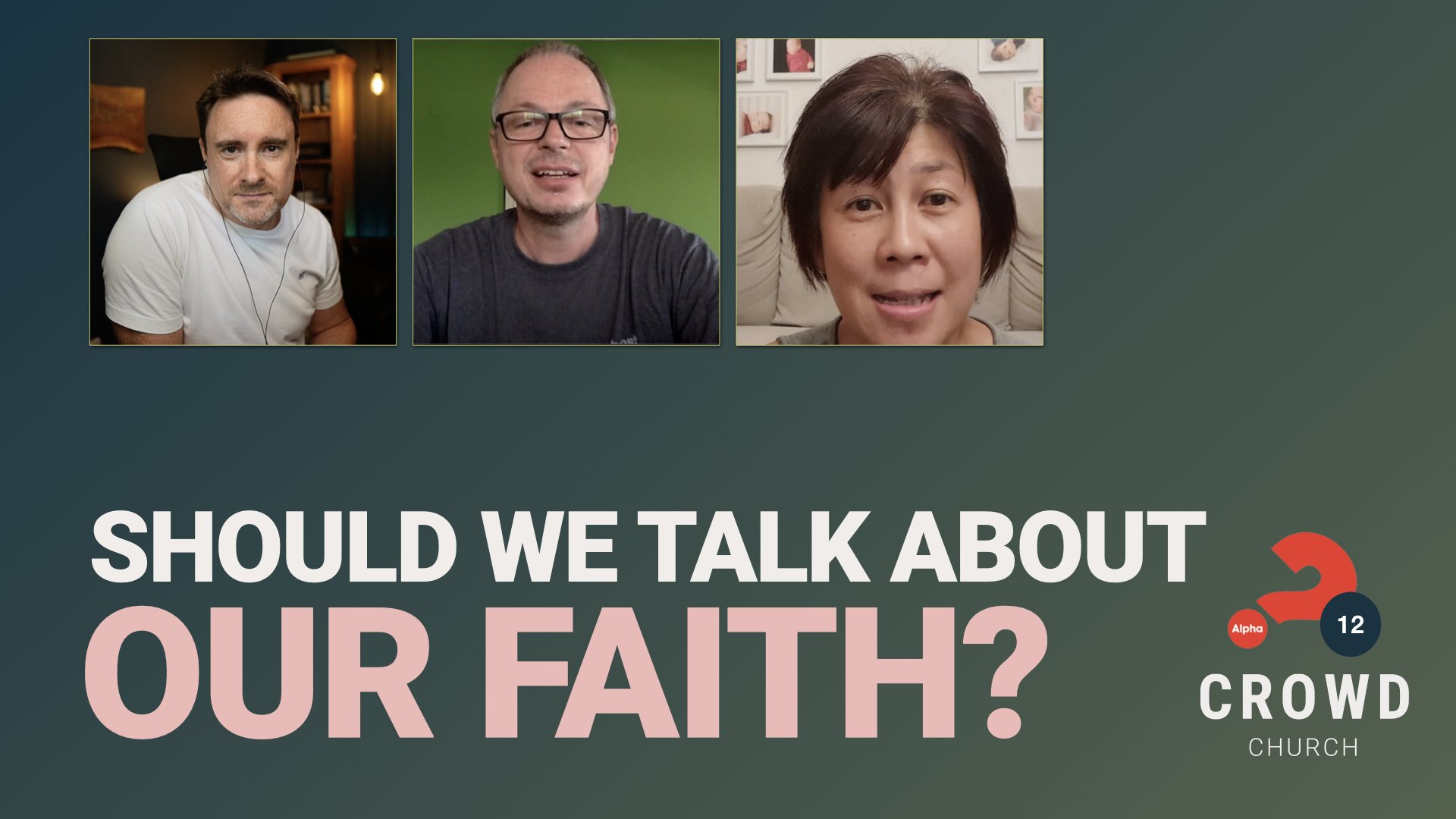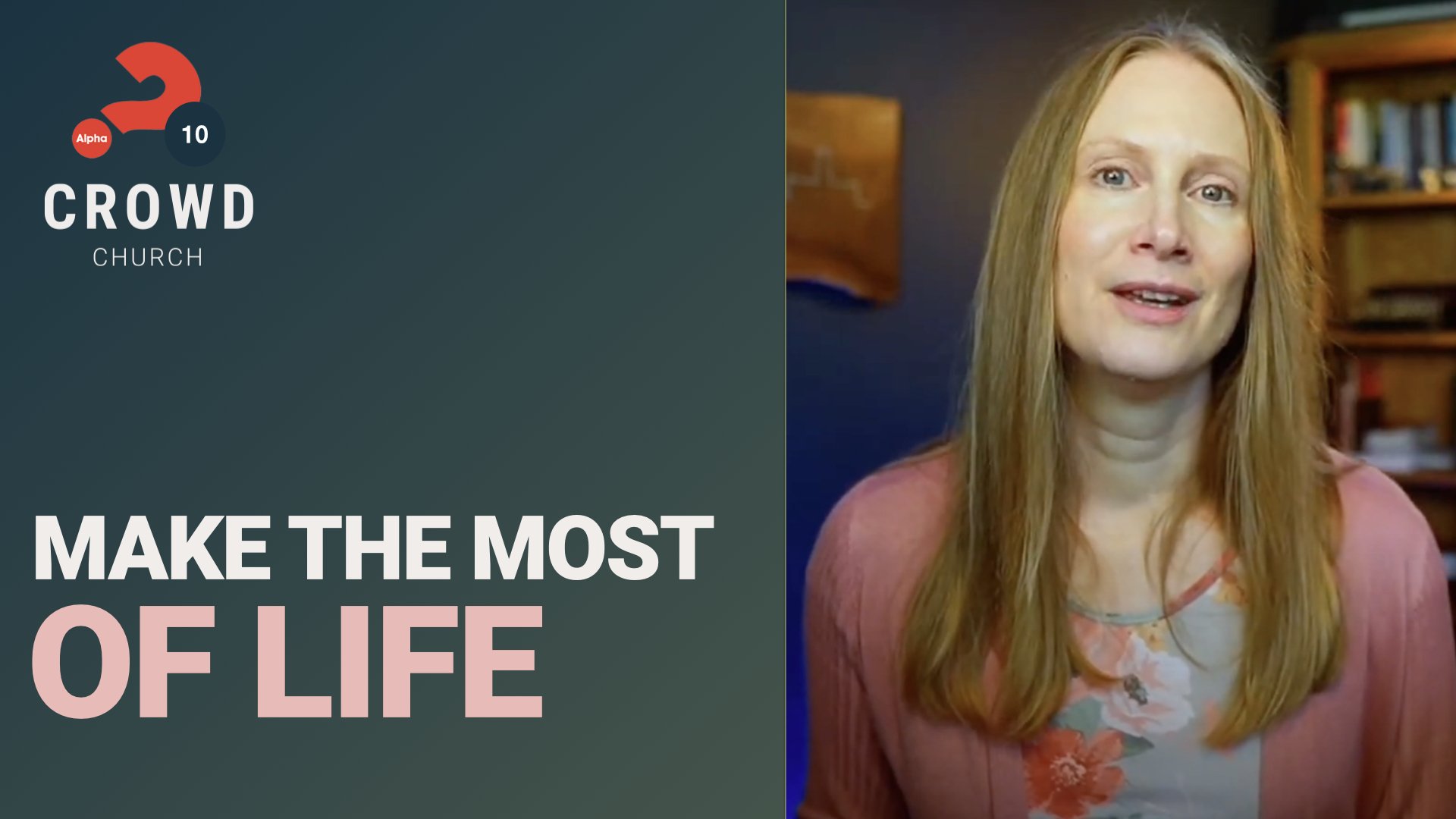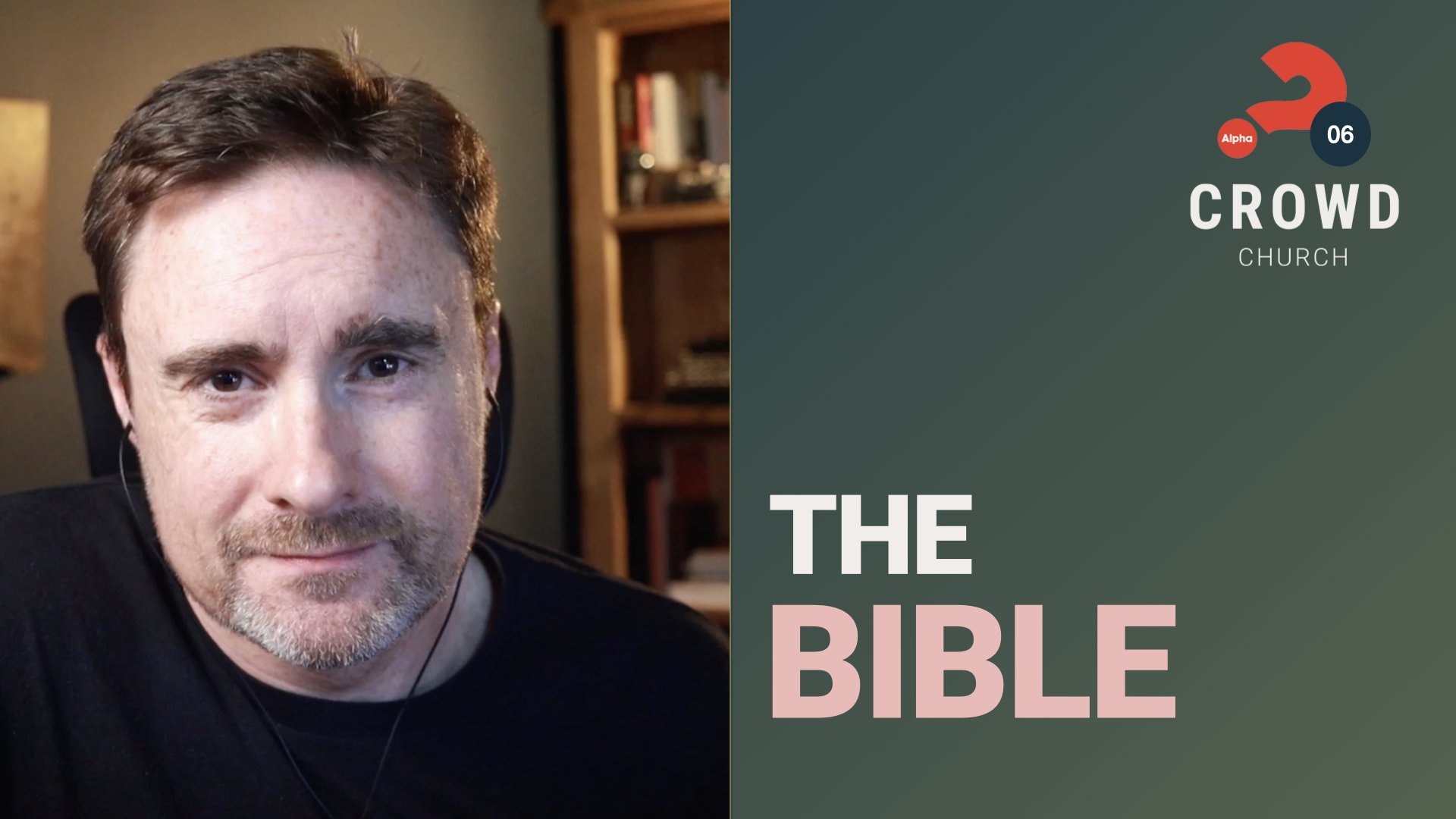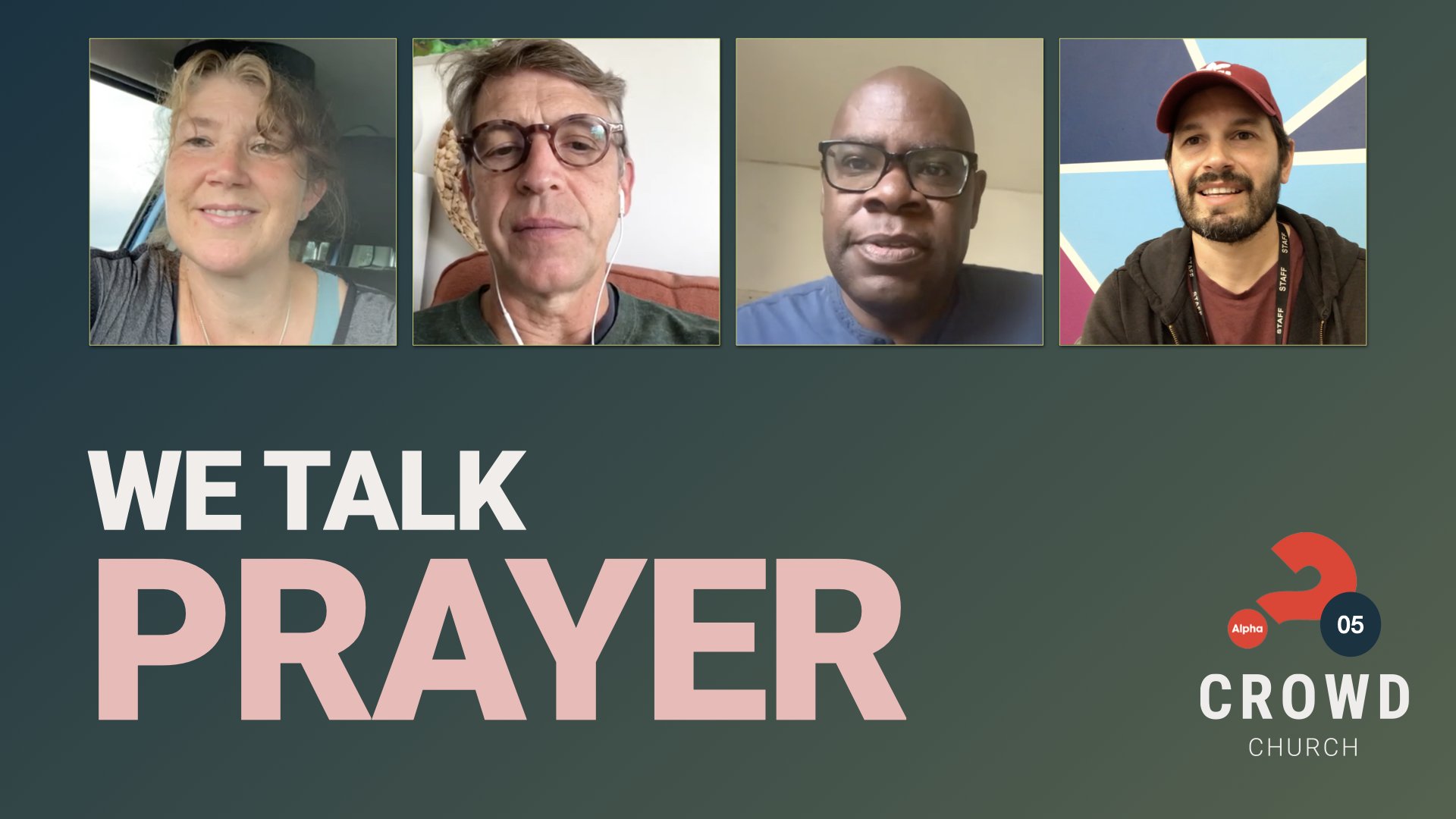Who is Jesus? Alpha Course 02
Video of the complete Livestream where Anna asks, is there more to life than this?
Video Timeline
Use the time stamps below to scrub through the video to find the place that you want
09:92 - Welcome from Matt & Sadaf
17:13 - Who Is Jesus? - Sharon Edmundson
39:01 - Worship
43:05 - Conversation Street
58:01 - Catch Up with Elias
59:34 - Wrapping Up with Matt & Sadaf
1:04:11 - Closing Worship
Talk: Who is Jesus?
Growing up in a Christian family
I grew up in a Christian family. When I was a child, I went to church every week. I believed in God, and I used to talk to him regularly. The church that I grew up in was relatively small, and we used to go on holidays together every year. When I was 15, our church went on holiday to Minehead in Somerset. Every night, the adults would have meetings where they sang and shared passages from the Bible. My friends and I would skip these meetings because they were boring and instead went to the beach. On the last evening of the holiday, after some persuasion from my parents, I went to the evening meeting.
That meeting was not boring!
There was a strong sense of God's presence, and I felt as though God was talking to me, saying it was time to make up my mind if I wanted to follow him for myself or not. Up to that point, although I believed in him, I was drifting along on my parent's faith.
Deciding for myself
At this point, I was in turmoil because I wanted to follow him, but I also wanted to do my own thing.
And I knew that the two things are not always that compatible. I fretted about it all night, but in the morning, I decided to take the plunge. Again, I had such a sense of his presence, and the Bible just came alive to me. I got baptised a year later, and then it all went downhill (yes, downhill!) Although I still wanted to follow God, I got disillusioned with the church, so I left, and as a result, I struggled with many things that I didn't know how to deal with.
When I was 18, I went to Exeter to study Occupational Therapy, and as part of the course, I read a book about mental health. And some of the things it said made me question my faith in a way that I'd not done before. Was God real? Or did I have an overactive imagination? Was there any objective evidence for my faith? These questions started me on a journey that lasted several years, where I questioned and searched for truth.
Is there any evidence for Christianity?
You can't prove Christianity mathematically, and you can't prove it scientifically. However, I believe things about our world point to God, and I think science is important. And scientific discovery has been used in so many things we take for granted in everyday life now. But science answers different questions to faith. Science answers questions such as when and how did this world come into being? What it can't answer is the question of who and why.
And to answer this, let’s use the example of cake.
Let's say that I send a slice of cake to the world's top scientists to examine. They'd be able to tell me the ingredients of the cake. They could look at it and guess when it was made. I am sure that they could give me all kinds of facts and figures about the cake, but they wouldn't be able to tell me who made the cake? And they wouldn't be able to tell me why the cake was made.
Now science and faith are both important, but they deal with different questions. Faith answers some very fundamental questions about life, and everyone has faith. Even an atheist has faith that there is no God. Those of us who believe in Jesus do so based on evidence.
Evidence and faith working together
Scientific evidence is not the only kind of evidence. Every time a jury brings back a verdict, they do so based on different types of evidence, including historical evidence, circumstantial evidence, etc. But every jury decision also requires a step of faith. It's the same with Christianity. There is evidence to support it, but it also requires a step of faith. The world around us strongly suggests that this world has a creator and the resurrection of Jesus strongly suggests that Jesus is who He says He is, that He is God come to us in human form.
Evidence for Jesus
If there is a God who wanted to reveal Himself to us, what would be the best way to do it? Is it possible that he could come to us in human form? And if so, what is the evidence? What about Jesus' existence? Did he even exist? There's overwhelming historical evidence that he did; very few historians would suggest otherwise.
From evidence outside the New Testament, that Jesus existed from historians, historians like Tacitus and Suetonius. The first-century Jewish historian Josephus wrote this about Jesus,
"There was about this time Jesus, a doer of wonderful works."
— Josephus
And then he got he goes on to talk about the crucifixion of Jesus and his alleged resurrection. So there's evidence outside the New Testament, but most of our evidence comes from inside the New Testament.
Can we trust the New Testament accounts of Jesus?
Now, of course, it was written a long time ago, and people ask how we know that what we have here hasn't been changed over time? And the answer is that we do know through a science called textual criticism.
Essentially, the way textual criticism works is like this, the more manuscripts you have, and the earlier they are, the more you can be sure about what the original said.
Here are some examples from other writings. I'll pick out just a couple of them and compare them with the New Testament.
So Livy's Roman history was written between 59 BC and 17 AD, but the earliest copy we have was written in 900 AD, that's about a 900-year gap, and we have 20 copies.
For Caesars, Caesars Gallic War, there is a 950-year gap. And we have nine to 10 copies.
Then we come to the New Testament. It was initially written between AD 40 and 100. And the earliest copy we have was written in AD 130. There are 5,309 Greek manuscripts, 10,000 Latin and 9,300 others, and it's unique amongst ancient prose writings.
One of the greatest ever textual critics JFA Hort said this,
"In the variety and fullness of the evidence on which it rests, the text of the New Testament stands absolutely and unapproachably alone amongst ancient prose writings."
FJA Hort
I'm not sure there's any secular historian who would disagree with that. So we know from evidence outside and inside the New Testament that Jesus existed, but who is he?
Who is Jesus?
Many today would say he was just a human being, maybe even a great human being. Some would say he's a religious teacher, but no more than that. But to suggest that he was the Son of God or indicate that he is God, well, that's going too far, isn't it?
There are two parts to this discussion:
The first part is to ask what did Jesus think about himself? Because if Jesus didn't think that he was God, well, that's the end of the argument.
And even if he did, the second part of the discussion is, was he right?
1: What did Jesus say about himself?
So what did Jesus say about himself? The first bit of teaching here, or the first piece of evidence, is that Jesus' teaching centred on himself. Great religious teachers usually point away from themselves. They don't say, look at me. They say, look at God. Jesus, who personified humility, said, "Look at me, come to me."
Jesus answered the question of ultimate meaning and purpose
“I am the bread of life, if you want that hunger satisfied, come to me.”
Then there's stuff in our lives that we don't like:
“If the Son (Jesus) sets you free, you’ll be really free.”
And then there's all the stuff that we carry around: worry, anxiety, fear and guilt:
“Come to me all you who are weary and burdened, and I will give you rest. If you want peace, peace of mind, come to me.”
““Anyone who receives you receives me, and anyone who receives me receives the Father who sent me.”
“Jesus replied, “Have I been with you all this time, Philip, and yet you still don’t know who I am? Anyone who has seen me has seen the Father! So why are you asking me to show him to you?”
Jesus' indirect claims
Jesus claimed to be able to forgive sins, which is a big deal. If someone offends you, you can forgive them. But you can't really go up to some random person in the street and say, "your sins are forgiven". Yet Jesus did, and when He did, the lawyers at the time replied, "Who can forgive sins, but God alone?" . Only God can forgive sins. Yet Jesus tells us that He can forgive sins too. Forgiveness is at the heart of what Jesus came to do, and it's at the heart of Christianity.
Jesus' direct claims
“The Father and I are one.”
Jesus' claim was tantamount to blasphemy in people's eyes at the time, so much so they tried to stone Him for it.
“Jesus said, “At my Father’s direction I have done many good works. For which one are you going to stone me?” They replied, “We’re stoning you not for any good work, but for blasphemy! You, a mere man, claim to be God.””
It's an astonishing claim by Jesus. But of course, a claim like this needs to be tested. And if you think about it, there are only three possibilities:
Either, it was not true, and Jesus knew that it was not true, in which case he was a fraudster.
Or else it was not true, and he didn't realise it was not true. He genuinely thought he was God, in which case, he was deluded.
But logically, there's only really one other possibility. And that is that it's true.
CS Lewis, one of the intellectual giants of the 20th century, and of course, best known as the author of The Chronicles of Narnia, said this,
A man who was merely a man, and said, the sort of things Jesus said, would not be a great moral teacher; He'd either be insane, or else he'd be the devil of hell. You must make your choice. Either this man was and is the Son of God, or else insane, or something worse. But let's not come up with any patronising nonsense about his being a great teacher. He's not left that option open to us. He did not intend to.
— C.S. Lewis
2: Was Jesus right in what He said about Himself?
There are all great claims, so what's the evidence to support His claims?
Jesus teaching
The first piece of evidence is his teaching. The teaching of Jesus is widely acknowledged to be the most outstanding teaching of all time. He said,
“The second is equally important: ‘Love your neighbor as yourself.’ No other commandment is greater than these.””
““Do to others whatever you would like them to do to you. This is the essence of all that is taught in the law and the prophets.”
Love your neighbour as yourself, do to other people as you would have them do to you. And then this, totally revolutionary the first person to say this,
“But I say, love your enemies! Pray for those who persecute you!”
Jesus' teaching has been the foundation of civilisation in the West. Many of our laws originate in the teaching of Jesus. We've advanced in the fields of science and technology and other things. Yet, in 2000 years, no one has ever improved on the moral teaching of Jesus; they're the most important words ever spoken. They're the kind of words you'd expect God to speak. So this is the first piece of evidence, his teaching.
Jesus' actions
Have you seen the TV series, the Chosen? It's a TV drama based on the life of Jesus, and it brings the Gospels to lie, as well as bringing out an aspect of his character that no other dramatisation I've seen has done, and that's his sense of humour. I thoroughly recommend it. It shows not just his miracles and character, but his love for the marginalised, his care for people, his healing of the sick. The gospels in the Bible show him ultimately laying down his life for us. The Bible says this,
“You see at just the right time, when we were still powerless, Christ died for the ungodly. Very rarely will someone die for a righteous person, though for a good person, someone might possibly dare to die. But God demonstrates His own love for us in this, while we were still sinners, Christ died for us.”
Jesus' Character
His character has impressed millions who wouldn't call themselves Christians. Time magazine describes Jesus as the most persistent symbol of purity, selflessness, and love in the history of humanity. His enemies could find no genuine fault. And his friends who knew him well said, This guy is without sin. I often think that a real test of character is when we're under pressure. And Jesus, when he was being tortured, said about his torturers,
“Jesus said, “Father, forgive them, for they don’t know what they are doing.” And the soldiers gambled for his clothes by throwing dice.”
Fulfilment of prophecy
No one else in the history of the world had a whole collection of books written about them before they were born. Jesus fulfilled over 300 prophecies, 29 of them in a single day. Well, you might say, "maybe he got hold of the Old Testament, the old Hebrew Scriptures, and he read all the prophecies. And he thought, right, I'd better go around fulfilling all of these"? And with some of them, that is possible, but for others, it isn't.
For example, it was prophesied that he would be born in Bethlehem. And by the time you're old enough to be able to read that prophecy or hear about it. It's too late as you've already been born.
The exact manner of his death was prophesied, the place of his burial, his resurrection, and then his conquest of death. All things outside of His control.
His Resurrection
The World death rate is holding steady at 100% All of us will die at some point. It looks final when you go to a funeral, and a coffin goes into the ground or is cremated. And it is unless death has been conquered. Unless when Jesus died and was buried, he was also raised to life. If he was, then there's hope.
Is it just wishful thinking? Yes, it is, if it isn't true. Check out our other videos on the evidence for the resurrection because the Christian faith has swept the whole known world, and it's still happening due to the resurrection. There are 2.5 billion Christians in the world today of every ethnicity, on every continent, from most nationalities, from every economic, social and intellectual background. They all speak of this encounter with the risen Jesus.
What do you think?
So when we look at what Jesus claimed about himself, the first part of the argument, it's clear that Jesus did claim to be a man whose identity was God. Was he deluded? Was he a fraud? When you look at the evidence of his teaching, the things he did, his character, the fulfilment of prophecy, his resurrection. I don't think it works to say that he was insane or, or a fraud.
On the other hand, it provides the most robust possible supporting evidence that what Jesus said about himself was true. So in my search for the truth, I've ended up back where I started: with Jesus. But what about you? Jesus asked this question of his disciples, who do you say I am? Who do you say he is? Jesus said, Follow me. And that's an invitation he extends to everyone. I'll finish with this verse,
“For God so loved the world that He gave His one and only Son, that whoever believes in Him shall not perish, but have eternal life”
CONVERSATION STREET
Questions we ask this week
Conversation Street is part of our live stream, where the hosts (in this case, Matt & Sadaf) chat through Sharon's talk and answer questions that were sent in through the live stream. You can watch the conversation in the video, it starts at 43 min 05 seconds into the live stream, or you can go straight there by clicking the button below. This week’s questions and topics of conversation are:
What's it like growing up in a Christian home?
What's it like not growing up in a Christian home?
Do you wrestle with this idea that Jesus is God?
Why do Jesus upset people?
Do we like to think we're the good guys and don't need God's grace?
How would you explain grace?
















